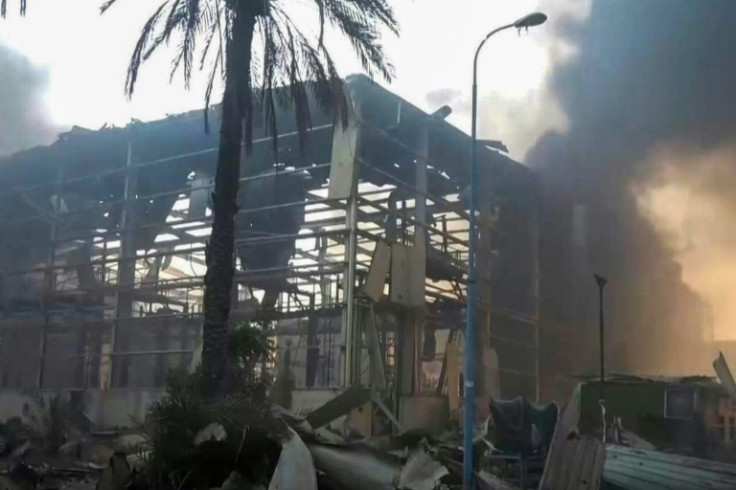Israeli air strikes pummelled Sanaa’s international airport and other targets in Yemen on Thursday, with Huthi rebel media reporting six deaths.
World Health Organization chief Tedros Adhanom Ghebreyesus said on social media he was at the airport during the strike, adding that “one of our plane’s crew members was injured”.
The Israeli military did not immediately respond to a request for comment on whether they were aware of his presence at the time.
The strikes targeting the airport, military facilities and power stations in rebel areas follow rising hostilities between Israel and the Huthis, part of Iran’s “axis of resistance” alliance against Israel.
Prime Minister Benjamin Netanyahu warned that Israel’s strikes would “continue until the job is done”.
“We are determined to cut this branch of terrorism from the Iranian axis of evil,” he said in a video statement.
UN Secretary-General Antonio Guterres on Thursday denounced the “escalation” in hostilities between Israel and the Huthis, saying the strikes on the Sanaa airport were “especially alarming”.
Tedros, who was in Yemen to seek the release of detained UN staff and assess the humanitarian situation in war-torn Yemen, said he and his team were about to board their flight when “the airport came under aerial bombardment”.
He said the air traffic control tower, departure lounge and runway were damaged in the strike.
“We will need to wait for the damage to the airport to be repaired before we can leave,” he added.
The rebel-held capital’s airport was struck by “more than six” attacks, with raids also targeting the adjacent Al-Dailami air base, a witness told AFP.
Yemen’s civil aviation authority said the strikes occurred as the UN aircraft “was getting ready for its scheduled flight”, adding that the airport planned to reopen on Friday.
A series of strikes were also fired at a power station in Hodeida, a witness and the Iran-backed Huthis’ official Al-Masirah TV station said.
The station said six people were killed in the strikes. Earlier, Huthi statements said two people died at the rebel-held capital’s airport, and one person was killed at Ras Issa port.
Huthi spokesperson Mohammed Abdulsalam called the strikes, a day after the Huthis fired a missile and two drones at Israel, “a Zionist crime against all the Yemeni people”.
The Israeli military said its “fighter jets conducted intelligence-based strikes on military targets belonging to the Huthi terrorist regime”.
The targets included “military infrastructure” at the airport and power stations in Sanaa and Hodeida, as well as other facilities at Hodeida, Salif and Ras Kanatib ports, an Israeli statement said.
“These military targets were used by the Huthi terrorist regime to smuggle Iranian weapons into the region and for the entry of senior Iranian officials,” the statement said.
“The Huthi terrorist regime is a central part of the Iranian axis of terror,” it added.
Iran’s foreign ministry condemned the strikes as a “violation” of peace and security.
“These aggressions are a clear violation of international peace and security and an undeniable crime against the heroic and noble people of Yemen,” foreign ministry spokesman Esmaeil Baqaei said in a statement.
Palestinian militant group Hamas, which is fighting Israel in the Gaza Strip, condemned the attack as an “aggression” against its “brothers from Yemen”.
On Saturday, days ahead of Wednesday’s missile and drone strike on Israel, 16 people were wounded by a Huthi attack in Tel Aviv.
The incident prompted a warning from Netanyahu, who said he ordered the destruction of the rebel group’s infrastructure.
The Huthis have fired a series of missiles and drones at Israel since the eruption of war in Gaza in October last year, claiming solidarity with the Palestinians.
The rebels, part of Iran’s “axis of resistance” against Israel and the United States, have also waged a months-long campaign against shipping in the Red Sea and Gulf of Aden.
Scores of drone and missile attacks on cargo ships have prompted a series of reprisal strikes by US and sometimes British forces.
Israel has also previously struck the Huthis in Yemen, including hitting ports and energy facilities, after rebel attacks against its territory.
In July, a Huthi drone attack on Tel Aviv killed an Israeli civilian, prompting retaliatory strikes on Hodeida.
Last week, before the latest volley of attacks, Netanyahu said the Huthis would “pay a very heavy price” for their strikes on Israel.
His defence minister Israel Katz said Thursday that Israel would “hunt down all the Huthi leaders… No one will be able to escape us”.
The Huthis control large parts of Yemen after seizing the capital and ousting the internationally recognised government in September 2014.
A Saudi-led coalition launched a military campaign to dislodge them in March 2015, triggering a war that has caused one of the world’s worst humanitarian crises.

AFP







Leave a Comment